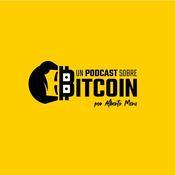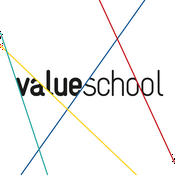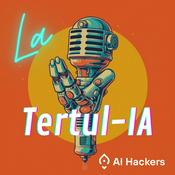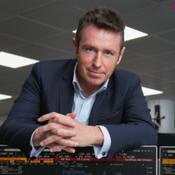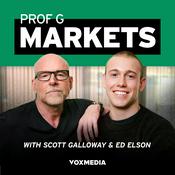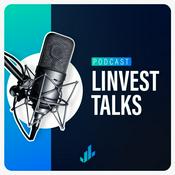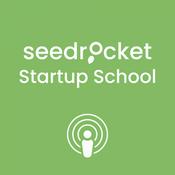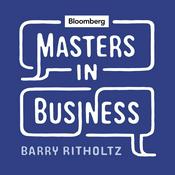26 episodios

More Tech Tomorrow, Coming 2026!
19/12/2025 | 0 min
We’re excited to announce that Tech Tomorrow will be extending Season 3 into early 2026. Join host David Elliman for more insightful conversations designed to help you navigate the complex world of emerging technology and make more informed decisions as a leader and decision-maker.You can expect deep dives into topics like AI, cybersecurity, and more.Be sure to follow the show on your preferred podcast app so that new episodes are delivered to your feed as soon as they’re released.About Zühlke:Zühlke is a global transformation partner, with engineering and innovation at its core. We help clients envision and build their businesses for the future – running smarter today while adapting for tomorrow’s markets, customers, and communities.Our multidisciplinary teams specialise in technology strategy and business innovation, digital solutions and applications, and device and systems engineering. We thrive in complex, regulated sectors such as healthcare and finance, connecting strategy, implementation, and operations to help clients build more effective and resilient businesses.Links:Zühlke WebsiteZühlke on LinkedInDavid Elliman on LinkedIn

Down the rabbit hole: Will our secrets survive the quantum computing leap with Dr. Sarah McCarthy
09/12/2025 | 26 min
Quantum computing may feel like a distant part of the future, but many experts believe its widespread adoption could arrive sooner than expected. And with it comes a profound challenge: today’s encryption, which protects global cybersecurity, banking, digital identity, and confidential communication, may no longer be secure.So what happens when quantum computers can break the cryptography that protects our most sensitive information?In this special Alice in Wonderland-themed episode of Tech Tomorrow, David Elliman speaks with Dr. Sarah McCarthy, Quantum Readiness Programme Lead at Citi, to explore the looming post-quantum era. Together, they discuss what executives, security leaders, and organisations need to understand about quantum risk, how to prepare now, and why waiting may already be too late.Through playful Wonderland metaphors inspired by Lewis Carroll, including the Red Queen’s race and the Garden of Talking Flowers, David and Sarah explain complex security concepts with clarity and imagination. They outline what quantum computing really is, how modern cryptography works, why cryptographic agility matters, and what could happen if organisations fail to adapt in time. The conversation emphasises that leaders must first understand their organisation’s current cryptographic estate, then develop a strategy that allows their systems to adapt and evolve, and finally begin taking practical steps today to ensure readiness well before ‘Q-Day’ arrives.Episode Highlights00:34 – Introducing the Wonderland theme and framing the topic.02:13 – What is quantum cryptography, and why does it matter?03:5 – How modern cryptography protects everyday digital life.06:16 – David Through the Looking Glass: Understanding the Red Queen’s Race.07:23 – Why security strategies must evolve continuously.09:24 – Cryptographic agility and how leaders can practice it.11:22 – The urgency behind quantum readiness.15:49 – David Through the Looking Glass: The Garden of Talking Flowers and digital estate management.16:32 – Practical, actionable steps executives can take today.19:59 – What is Q-Day, and when might it arrive?22:30 – David Through the Looking Glass: The White Rabbit of quantum security.23:03 – Which companies are making progress in quantum-safe security?24:38 – Can our secrets survive the quantum leap?About Zühlke:Zühlke is a global transformation partner, with engineering and innovation at its core. We help clients envision and build their businesses for the future – running smarter today while adapting for tomorrow’s markets, customers, and communities.Our multidisciplinary teams specialise in technology strategy and business innovation, digital solutions and applications, and device and systems engineering. We thrive in complex, regulated sectors such as healthcare and finance, connecting strategy, implementation, and operations to help clients build more effective and resilient businesses.Links:Zühlke WebsiteZühlke on LinkedInDavid Elliman on LinkedInDr. Sarah McCarthy WebsiteDr. Sarah McCarthy on LinkedIn

Can executives balance AI innovation with societal responsibility with Lord Clement-Jones
25/11/2025 | 27 min
As artificial intelligence continues to redefine industries, the question isn’t just what we can build, but what we should. In a world of accelerating automation and algorithmic decision-making, can leaders harness innovation without losing public trust?In this episode of Tech Tomorrow, David Elliman speaks with Lord Clement-Jones, Liberal Democrat peer, former Chair of the House of Lords AI Select Committee, and co-chair of the All-Party Parliamentary Group on AI. Together, they explore how business leaders can align technological progress with human values and why doing so is not just ethical but essential for sustainable innovation.They unpack what ‘responsible AI’ really means in practice: from explainability and human oversight to data quality, fairness, and transparent governance. Lord Clement-Jones argues that regulation, far from stifling innovation, can actually enable it by creating the trust, certainty, and accountability businesses need to adopt AI confidently.The discussion also explores the roles of boards and executive committees, including why AI literacy is now a core competency, how to establish effective oversight mechanisms, and what it means to integrate ethics into AI design rather than retrofit it later. Drawing on his book Living with the Algorithm: Servant or Master?, Lord Clement-Jones reflects on how technology should serve humanity, not the other way around, and why progress must be measured by its benefits to people, not just profit.Episode Highlights:01:39 – Introducing Lord Clement-Jones.03:45 – Why Lord Clement-Jones decided to write Living with the Algorithm: Servant or Master.06:03 – What is the biggest risk that boards face if they don’t take into account societal responsibility in relation to AI?07:20 – David’s thoughts: Steps boards and executives can take to ensure they implement useful and trusted AI tools.08:39 – Defining ethical frameworks in AI.10:21 – What sort of skill sets do boards need to help them work effectively with AI?11:31 – What can boards and executive committees do to ensure they are implementing AI tools ethically?13:25 – The problem with black-box solutions.15:56 – David’s thoughts: The impossibility of retrofitting responsibility into AI systems.17:39 – Changing the culture around AI implementation.20:06 – Why Lord Clement-Jones included the subtitle Servant or Master in his book title.23:14 – David’s thoughts: The three pillars of responsible AI.25:26 – The current political landscape and how AI regulation fits into it.27:16 – Can executives balance AI innovation with societal responsibility?About Zühlke:Zühlke is a global transformation partner, with engineering and innovation at its core. We help clients envision and build their businesses for the future – running smarter today while adapting for tomorrow’s markets, customers, and communities.Our multidisciplinary teams specialise in technology strategy and business innovation, digital solutions and applications, and device and systems engineering. We thrive in complex, regulated sectors such as healthcare and finance, connecting strategy, implementation, and operations to help clients build more effective and resilient businesses.Links:Zühlke WebsiteZühlke on LinkedInDavid Elliman on LinkedInLord Clement-Jones WebsiteLiving with the Algorithm: Servant or Master? AI Governance and Policy for the Future

Will AI and digital twins make animal testing in drug discovery obsolete with Professor Julie Frearson
11/11/2025 | 23 min
AI and digital twins are redrawing the boundaries of drug discovery. Once defined by lab benches, animal studies, and years of trial and error, the field is now embracing virtual methodologies that promise faster, safer, and more precise innovation. But could these technologies ever make animal testing obsolete?In this episode of Tech Tomorrow, David Elliman speaks with Professor Julie Frearson, SVP and Chief Scientific Officer at Charles River Laboratories, about how artificial intelligence is transforming early-stage drug discovery. Julie explains how AI is already accelerating small-molecule design and enabling the use of virtual control animals, reducing the need for live testing without compromising scientific integrity.They also unpack the growing challenges of explainability, bias, and regulation in AI-driven science. From ensuring transparency and accountability in complex models to understanding how regulators like the FDA are beginning to accept hybrid data sets that combine in vivo results with AI predictions, the discussion balances optimism with realism in a rapidly evolving field.Ultimately, Professor Julie and David agree that while AI is reshaping discovery, humans must remain firmly in the loop. For now, it is the only way to ensure that innovation remains both ethical, trustworthy, and safe.Episode Highlights:01:31 – Areas of drug discovery already transformed by AI and digital twins.03:25 – Digital twins in animal testing and the creation of “virtual animals.”05:50 – David’s thoughts: What executives often get wrong about digital twins.07:30 – How digital twins accurately recreate parts of animals.10:11 – How regulation currently views AI models in drug discovery.13:30 – The timeline for regulators to become more comfortable with hybrid data sets.14:37 – David’s thoughts: How ‘black box’ AI processes create challenges, and how to address them.16:31 – The role of humans in the drug discovery loop.17:37 – Will technology outpace regulation?20:34 – Could AI and digital twins make animal testing in drug discovery obsolete?About Zühlke:Zühlke is a global transformation partner, with engineering and innovation at its core. We help clients envision and build their businesses for the future – running smarter today while adapting for tomorrow’s markets, customers, and communities.Our multidisciplinary teams specialise in technology strategy and business innovation, digital solutions and applications, and device and systems engineering. We thrive in complex, regulated sectors such as healthcare and finance, connecting strategy, implementation, and operations to help clients build more effective and resilient businesses.Links:Zühlke WebsiteZühlke on LinkedInDavid Elliman on LinkedInProfessor Julie Frearson on LinkedInCharles River Laboratories Website

Will the next biotech breakthrough be digital before it’s biological with Bibi Ephraim
28/10/2025 | 27 min
AI is transforming biotechnology from the inside out. What was once a world of petri dishes and pipettes is now increasingly powered by algorithms, models, and digital twins. But as machine learning accelerates drug discovery and reshapes clinical trials, how far can we go before biology itself becomes the follower, not the leader?In this episode of Tech Tomorrow, David Elliman speaks with Bibi Ephraim, Head of Digital Sciences at Genentech, about how artificial intelligence is redefining the biotech landscape. They explore how data-driven approaches are rapidly compressing timelines in drug discovery, enabling precision medicine, and even simulating virtual clinical trials.They also tackle the cultural and organisational transformations needed to make digital biotech work; from breaking down data silos and fostering collaboration across competitors, to treating data as a product and investing in strong governance. Drawing parallels with digital transformation in other industries, they ask what it will take for biotech to move from project-based to product-based innovation, and why pre-competitive collaboration could unlock the next generation of cures.Episode Highlights:01:40 – What do AI, data science, and digital governance in the biotech landscape look like today?03:06 – Biotech and the data foundations needed for transformation.04:52 – Examples of successful data-driven approaches in biotech.08:10 – Will parts of the medical process be completely handed over to AI?09:39 – David’s thoughts: The importance of sustained, iterative innovation.11:49 – The biggest mistake Bibi sees executives make in relation to data.13:08 – The huge issue of low-quality data.14:59 – Data sharing is critical in this field.19:03 – David’s thoughts: How pre-competitive collaboration benefits everyone.21:17 – Is biotech reaching a standardisation tipping point?24:11 – Can biotech scale digitally and effectively?26:30 – Will the next biotech breakthrough be digital before it’s biological?28:33 – If digitalisation expands, will researchers miss the “happy accidents” of drug discovery?About Zühlke:Zühlke is a global transformation partner, with engineering and innovation at its core. We help clients envision and build their businesses for the future – running smarter today while adapting for tomorrow’s markets, customers, and communities.Our multidisciplinary teams specialise in technology strategy and business innovation, digital solutions and applications, and device and systems engineering. We thrive in complex, regulated sectors such as healthcare and finance, connecting strategy, implementation, and operations to help clients build more effective and resilient businesses.Links:Zühlke WebsiteZühlke on LinkedInDavid Elliman on LinkedInBibi Ephraim on LinkedInGenentech Website
Más podcasts de Economía y empresa
Podcasts a la moda de Economía y empresa
Acerca de Tech Tomorrow
Escucha Tech Tomorrow, Tengo un Plan y muchos más podcasts de todo el mundo con la aplicación de radio.es
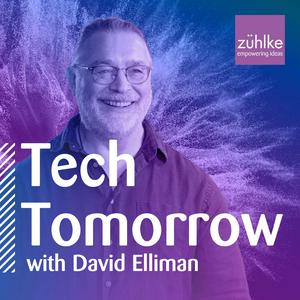
Descarga la app gratuita: radio.es
- Añadir radios y podcasts a favoritos
- Transmisión por Wi-Fi y Bluetooth
- Carplay & Android Auto compatible
- Muchas otras funciones de la app
Descarga la app gratuita: radio.es
- Añadir radios y podcasts a favoritos
- Transmisión por Wi-Fi y Bluetooth
- Carplay & Android Auto compatible
- Muchas otras funciones de la app


Tech Tomorrow
Descarga la app,
Escucha.

